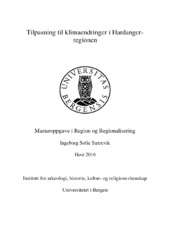| dc.contributor.author | Sætrevik, Ingeborg Sofie | |
| dc.date.accessioned | 2016-10-10T07:17:29Z | |
| dc.date.available | 2016-10-10T07:17:29Z | |
| dc.date.issued | 2016-08-31 | |
| dc.date.submitted | 2016-08-31 | eng |
| dc.identifier.uri | https://hdl.handle.net/1956/12955 | |
| dc.description.abstract | Verdens klima er i endring og samfunnet må tilpasses disse endringene. Det er stor usikkerhet knyttet til hva som blir konsekvensene av klimaendringene. Klimaframskrivninger for Norge varsler om en stigning i årlig gjennomsnittstemperatur på mellom 2,3 °C og 4,6 °C innen år 2100. Gjennomsnittlig årsnedbør i Norge kan stige med 31 prosent mot slutten av århundret. Et varmere og våtere klima medfører økt fare for flom, ras og skred. I tillegg vil klimaendringene medføre at hendelser inntreffer på nye og uventede steder. I Norge har kommunene det primære ansvaret for klimatilpasning gjennom arealplanlegging. Dette arbeidet er omfattende og krever kunnskap, kompetanse og kapasitet i tillegg til samarbeid mellom aktører i forvaltningen. I denne studien blir kommunenes utfordringer knyttet til tilpasningsarbeidet analysert. Funnene i denne studien bekrefter mye av tidligere forskning. Det foreligger et tilpasningsetterslep i kommunene. Dette skyldes blant annet at kommunene mangler menneskelige og økonomiske ressurser. Videre ser det ut til at engasjerte ansatte i kommunene og interkommunale samarbeid kan bidra til å heve kompetansen rundt klimatilpasning. | en_US |
| dc.description.abstract | The climate in the world is changing and global warming is a fact. Climate change adaption means preparing for and minimizing the consequences posed by climate change. The title of this thesis is Climate change adaption in Hardanger". This is a case study of climate change adaption in Hardanger region in western Norway. The research question is Which challenges do the municipalities in Hardanger face in their work with climate change adaption?" Municipalities in Norway have primary responsibility for adapting society and nature to future climate change. In this thesis, my goal has been to examine the challenges municipalities in Hardanger face in dealing with climate change adaption. The theoretical approach in this study is focused on the relationship between science and municipal planning. While there is a wide range of research concerning climate changes and adaption, studies have shown that one of the main challenges in adaption in municipalities is a lack of knowledge, competence and capacity. My methodological approach in this study has been qualitative. I have conducted qualitative interviews with municipal planners and the mayors from the seven municipalities in Hardanger. The main findings in this study are that there is a backlog in the municipalities work on adaption, and there are several reasons for this. One of the reasons is a lack of capacity and competence to make use of research in their work with adaption. Municipalities plan mainly on basis of national policies and legal requirements. Another reason is that the municipalities are still working on adapting society for current climate and requirements, which means they do not have the capacity to plan for future climate changes. However, there are differences between municipalities, and an exciting finding is that enthusiasts in municipal management can enhance the expertise on climate change adaptation. | en_US |
| dc.format.extent | 1320743 bytes | eng |
| dc.format.mimetype | application/pdf | eng |
| dc.language.iso | nob | eng |
| dc.publisher | The University of Bergen | eng |
| dc.subject | klimaendringer | eng |
| dc.subject | Hardanger | eng |
| dc.subject | region | eng |
| dc.subject | regionalisering | eng |
| dc.subject | klimatilpasning | eng |
| dc.title | Tilpasning til klimaendringer i Hardanger-regionen | eng |
| dc.type | Master thesis | |
| dc.rights.holder | Copyright the Author. All rights reserved | eng |
| dc.description.degree | Master i Region og regionalisering | |
| dc.description.localcode | MAHF-REG | |
| dc.description.localcode | REG350GEO60 | |
| dc.subject.nus | 713999 | eng |
| fs.subjectcode | REG350GEO60 | |
